- Home
- Trevor Hoyle
Last Gasp Page 15
Last Gasp Read online
Page 15
Was what he was being asked to sanction any more monstrous than that? No, except that he would not live to see the consequences. The seeds of death were already within him, his escape route to eternity. History would judge him on this one decision—always supposing there was anyone left to write it.
“Is there a realistic assessment of the potential threat?” asked General Smith, the army’s representative on the Joint Chiefs. “Three years has been mentioned as a finalization point. So what exactly can we expect to see happen in 2001?”
Madden looked up from his pad and gave an almost imperceptible nod to Farrer. The scientist had been exhaustively briefed and rigorously rehearsed, and he launched in confidently.
“There are several possible effects of the rivers’ diversion scheme— code-named Project Arrow by the Soviets—three of which we regard as presenting real hazards to the United States.
“First, the melting of the ice in the Spitsbergen region north of Scandinavia, known as the Eurasian Basin, will produce positive feedback, causing more ice to break up and melt over an increasingly wide area of the Arctic Ocean. This will bring a rise in mean sea level of between seventy and one-hundred-fifty feet, flooding many of our coastal cities and towns, including New York, Los Angeles, San Francisco, Miami, New Orleans, and scores of other places.
“Second, the change in the ice cover will almost certainly disrupt the circumpolar wind pattern in the Northern Hemisphere, altering the climate right across Europe, Siberia, Alaska, and Canada. This in turn will affect the climate of the United States. It isn’t possible to know precisely how, though computer modeling studies indicate that the average temperature of the midwestern states will fall by something like four to seven degrees, which will effectively wipe out all grain production in that region.
“Third, the atmospheric circulation systems will also be affected by the warming of the Arctic Ocean, and since we know that these directly relate to the weather in the tropics it is reasonable to assume that the southern states will experience a shift in climatic patterns. Again, this is impossible to predict accurately, but we believe that the weather will become much more erratic, alternating between torrential rainfall on the scale of monsoons in the southeast and prolonged droughts in the western desert regions.”
“Floods, Starvation, Drought,” barked Blindeye Wolfe, spelling it out in headlines. He looked grimly along the table toward the secretary of defense, eyes narrowed so that they almost disappeared in the creases of his face. “Jesus, the Soviets have the perfect weapon—the goddamn climate! No call to use their nuclear capability. They’ll just drown, starve, and fry us into submission!”
“How much of this is conjecture and how much is fact?” Lebasse said.
Farrer’s fair complexion colored a little. “Well, sir, it’s extremely difficult to prove until it actually happens,” he admitted. “We rely on computer modeling studies for much of our information, but even the most conservative estimates are very disturbing. A minor change in global climate can have disastrous long-term effects.” He cleared his throat. “For example, it’s been calculated that an increase of only four degrees Celsius would be required to melt the entire polar ice cap. The Russians won’t achieve that, but even a fraction of that increase would be enough to bring about the effects I’ve outlined.” He glanced at Madden, but the major was still intent on his doodling.
Lebasse’s expression remained inscrutable. The concealed lighting in the windowless room made blurred highlights on the dome of his head.
“That’s a pretty horrific scenario,” he said eventually, and then, as if sparked by a new thought, “Why isn’t the president’s senior scientific adviser here today?”
Major Madden stirred himself. He had drawn a dagger through the erect penis, which was dripping blood. “DEPARTMENT STORE has a special security status, Mr. Secretary. Access is restricted to designated military personnel.”
“And that excludes Professor Lucas?” Lebasse frowned.
“Yes, sir.”
Lebasse sighed, shaking his head. “That’s a pity. I’d like his opinion on the scientific validity of all this.” He tapped the thick dossier and looked across at Farrer. “I’m not disputing anything you’ve told me, young fella, but before I make my recommendations to the president I want to be absolutely sure we’ve got this right.” He added darkly, “I know all about computer predictions. They can be made to prove, or disprove, just about anything you care to name.”
“These came from the DELFI facility at the National Center for Atmospheric Research,” Farrer supplied helpfully. “It’s acknowledged to have the most sophisticated and comprehensive predictive capability anywhere in the world.”
“That I don’t doubt,” Lebasse muttered. “But I’m damned if a decision of this magnitude is going to be based on the say-so of a box of microchips, no matter how ‘sophisticated and comprehensive.’ ” His gaze swiveled in the direction of General Wolfe and Major Madden. “I don’t see any reason why Professor Lucas can’t be given clearance of DEPARTMENT STORE, do you? He is the president’s senior adviser in these matters.”
Madden looked up from the pad on which he was drawing, rather crudely, a naked woman with huge breasts and pneumatic thighs, complete with genitalia. “I’m not completely happy about that, sir—”
“Dammit, man, why not? Do think Gene Lucas is a security risk?” If the secretary of defense decreed it, then of course it would have to be, Madden knew full well. But it couldn’t be allowed to happen. Lucas wasn’t in anyone’s pocket: He’d give an unbiased and independent evaluation of the Russian threat and the merits of the U.S. project to counter it. Which may, or may not, be in their favor.
They’d have to head this off somehow.
Correction. He’d have to head it off.
“Yes, Mr. Secretary, of course. I’m pretty sure that can be arranged.” Madden smiled with his thin lips. “It will have to be processed through Advanced Strategic Projects, under whose auspices DEPARTMENT STORE has been developed, but that’s a mere formality.”
“How long?”
“Sir?”
“How long will it take to give Professor Lucas security clearance?” asked Lebasse impatiently.
“Forty-eight hours.”
“Good. That’s fine.” Lebasse leaned back, palms pressed together. “Providing there isn’t a conflict of interests.”
“What are you talking about?” Lebasse curled his hands into little fists and rested them on the table. “What conflict of interests?” He was watching Major Madden suspiciously and making no attempt to conceal it.
Madden’s face didn’t betray for an instant how close to the wind he was sailing. Without a moment’s hesitation he replied smoothly, “When ASP was set up, six years ago, one of the directives was to the effect that no military or scientific personnel who had spoken out against Agent Orange were to be permitted access to or knowledge of DEPARTMENT STORE in any shape or form. Hence the special security classification.”
Yes, that made sense, Lebasse had to admit. Agent Orange was the chemical defoliant used in Vietnam, which years after the war ended was found to have maimed and killed thousands of American combat troops and aircrew, causing cancer, skin diseases, ugly growths on various parts of the body, as well as genetic damage. Many of their children had been born with malformed limbs, blindness, heart defects, duplicate reproductive organs, and internal organs growing outside their body.
Anyone who had voiced disgust or outrage over Agent Orange wouldn’t countenance DEPARTMENT STORE in a million years, Lebasse could see that. So what stance had Gene Lucas taken on the issue? Lebasse didn’t know.
Neither did he know that Major Madden had two minutes previously invented the ASP directive. None such existed. The deception was risky but necessary under the circumstances. Madden would dig up something on Lucas and Agent Orange, and if he couldn’t he’d invent that too.
“Then I’ll leave it with you, Major,” Lebasse said. “You’ll inform my off
ice the minute you have anything.”
“Yes, Mr. Secretary.” As if he were making a note, Madden drew a bold arrow from the woman’s vagina to the name of the secretary of defense heavily ringed in black. “Without delay.”
“One question I’d like to ask Major Madden, Tom, before we wind up,” said General Stafford.
“Sure, Walt, go ahead.”
“Assuming we get presidential approval, how soon before DEPARTMENT STORE is fully operational? I mean combat-ready?”
“Fourteen months.”
“You sound very sure of that, Major.”
“That’s because I am very sure, General. We already have the components—chemicals, self-destruct supertankers, standby missiles. What remains is a matter of coordination and implementation. Mere logistics.”
Lebasse rubbed a whitish substance from the corner of his mouth and looked at his fingertips. “Assuming you get presidential approval,” he said quietly.
Chase stood before the tinted window looking out at the serrated mountain peaks etched against the bright blue Colorado sky, incredibly sharp and clear even though twenty miles away.
“Don’t you find the view distracting, Bill?”
“Binch,” said Bill Inchcape with a smile. “Everybody calls me Binch.” He heaved his bulk out of the chair and wandered over to the window. “It is pretty spectacular, I guess, but after twelve years it’s just part of the scenery.” He caught Chase’s eye and chuckled. “I mean, it is the scenery, what am I talking about?”
“It certainly beats the view from my London flat,” Chase remarked enviously. “If I had this to look at I’d never get a thing done.”
After nearly five weeks of being continually on the move he was starting to feel jaded and travel-weary. The magnificent mountains and wide-open spaces were a tonic: just what he needed to buck up his spirits and restore his mental edge.
“What do you think, Gavin, is the information of any use?” Binch wanted to know, tucking his pudgy hands into the pockets of his voluminous trousers. He weighed 250 pounds, and knew the risk, but had failed miserably at practically every kind of diet. The only thing left was to have his jaw wired up.
Chase nodded. “I’ll have to work the technical stuff into the text somehow, soften it up. The pieces are aimed at the lay reader, not scientists, so it’ll have to be pitched at that level.”
“Let me tell you something,” Binch said frankly. “A few years ago I’d have kicked you out the door as one more environmental crank. I used to think it was a load of hogwash; you know, reporters, TV pundits trying to jump on the scare bandwagon.”
“But not anymore?”
Binch shook his head so that his jowls quivered. “There’s too much going on up there we don’t know about.” He nodded toward the empty blue sky. “And what we do know isn’t exactly reassuring. Living with DELFI has taught me that much.”
“You use DELFI for climatic modeling,” Chase said.
“Right. Determining Environmental Logistics for Future Interpretation.” Binch made a face. “Damn fool name, I know, but I guess we’re stuck with it.”
Chase’s research for his piece on computer weather modeling came in useful here. He’d learned that as far back as 1978 the major nations had cooperated in mounting a climate monitoring survey, known as the Global Weather Experiment. It was an ambitious multimillion-dollar program involving the simultaneous launching of five geostationary satellites and two polar-orbiting satellites. Aircraft from a score of nations fitted with sensitive measuring equipment carried out a systematic probing of the atmosphere and the oceans. More than forty surface vessels were used to make oceanic and atmospheric observations in the Southern Hemisphere, and a network of automatic data buoys supplied a constant update on currents, wind strength, and rainfall.
The purpose of the Global Weather Experiment had been to collect data as a basis for computer modeling studies, but it was then realized that existing installations were hopelessly inadequate in handling this wealth of information. What was needed was a computer simulation facility that could formulate a mathematical model of the exceedingly complex climatic system worldwide, able to simulate every variability in climate caused by natural and man-made changes in the atmosphere and oceans, and come up with accurate long-term predictions.
Thus, in 1988, DELFI came into being. Acknowledged from the start as the most powerful and sophisticated facility of its kind, DELFI had further improved its capability by receiving information by microwave link direct from ATOP 7 (Astronomical and Terrestrial Observation Platform), which was the latest U.S. space platform and the first nonmilitary one, completed two years before.
“How far ahead are you forecasting?” Chase asked.
“Currently we’re running three predictive programs—ten, fifteen, and twenty years.” Binch was about to say something else, and hesitated.
“Restricted?” Chase said astutely.
Binch nodded, meeting Chase’s eye with a sour smile. “As you might know, the military have a finger in this, as in everything else. I guess they think the Russians should have to sweat for their own climatic predictions instead of getting ours for peanuts.”
“I can see that. But I don’t see the military application.”
“Me neither. If C02 is going to be a problem twenty years from now, it’ll be the same for everybody. There’s no military value in that so far as I can figure out.”
“Unless you’re the first to know about it and plan accordingly,” Chase said, testing a speculation. Yet even supposing DELFI predicted a sharp rise in carbon dioxide over the next twenty years, so what? Such an increase had been recognized and plotted for decades. Did Bill Inchcape know something else that he couldn’t reveal?
Binch returned to the desk and eased himself down. “You’ll appreciate I can’t say more, Gavin. If ASP got to hear I’d even been talking to you they’d ball me out and cancel my pension.”
“ASP?”
“Advanced Strategic Projects. They’re some kind of scientific offshoot of the army based at the Pentagon. I don’t know a lot about them except they rank pretty high in the Defense Department.”
“How often do you submit information to them?”
“Hey now,” Binch protested mildly. “Don’t dig too deep.” He took his time lighting a cigarette and sucked in a lungful of smoke. “This is strictly off the record, okay? We give them an update when there’s been any significant change, usually about every six months. There’s no set schedule.”
Chase showed surprise. “Things change that rapidly?”
“Let’s say that as we feed in additional data our predictions become more accurate,” Binch amended. “Right now, in fact, we’re working on a new software package that we hope will sharpen up our accuracy by at least fifty percent. We’ve got a new computer specialist, an ex-Scripps guy, who’s absolutely brilliant.”
“What does ASP do with the information?”
“I don’t know,” Binch replied, giving him a level stare. “And if I did I wouldn’t tell you.” His expression softened. “How’d you like to come to dinner this evening if you’ve no other plans? My wife’s a terrific cook—as you can see.” He patted his lavish paunch.
Chase had met with this kind of hospitality throughout his trip, and he was delighted to accept. Americans on their home ground, he had found, were the warmest and most generous of people.
To his relief the occasion was quite informal. As Binch had promised the food was delicious, and Bill and Stella Inchcape the perfect hosts. Nothing was too much trouble, yet they didn’t fuss over him, treating him rather as an old friend of the family. There were two other guests, the “ex-Scripps guy who’s absolutely brilliant,” who was called Frank Kollar, and his companion for the evening, Ruth Patton, a doctor specializing in diagnostic research at a hospital in Denver.
After the meal they went out onto the patio and sprawled in comfortable chaise lounges, drinking coffee and brandy under the stars. The night was warm and the air
fragrant with the scent of pines. There was a sharper, almost bitter smell too that Chase couldn’t identify.
“Cactus flower,” Stella Inchcape informed him. “They don’t usually grow this far north, but this is the third or fourth year we’ve had them. They’re all over the place. I’ve asked Binch to cut them back but he’s too lazy to get off his derriere.”
“What I hate about gardening is that it’s a waste of time,” Binch said. “Once it’s been cut why can’t grass stay cut!”
“We’d be in trouble if it did,” Chase said.
Ruth Patton asked him about his assignment and he explained about the series of articles he’d been commissioned to write for Sentinel.
“You don’t sound like a journalist to me,” she said, appraising him with frank dark eyes. She was a slender, rather elegant woman with dark curly hair that framed a sensitive, intelligent face.
He gave her a lazy smile. “That’s probably because I’m a marine biologist by training and inclination. I’ve only been writing science stuff for the past four or five years.”
“What made you switch?” asked Frank Kollar.
Chase had been asked this before and it was tempting to evangelize. Instead he gave them the standard routine that as an individual scientist he had felt his influence was minimal, whereas as a science writer (he didn’t use the word journalist) he might conceivably arouse public opinion and get things changed. It was his way of making a positive contribution to the environmental debate.
“You really believe we’re heading for the final showdown?” said Frank Kollar with a faint smile. He wore heavy horn-rimmed glasses, which were out of keeping with his compact, powerful build, but otherwise suited his air of laid-back cynicism, which Chase thought rather patronizing.

 Vail
Vail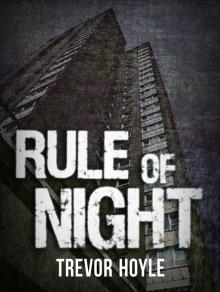 Rule of Night
Rule of Night The Man Who Travelled on Motorways
The Man Who Travelled on Motorways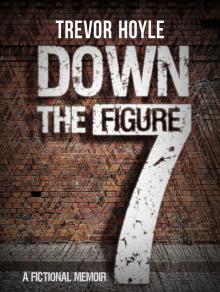 Down the Figure 7
Down the Figure 7 The Gods Look Down
The Gods Look Down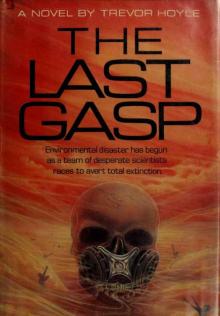 Last Gasp
Last Gasp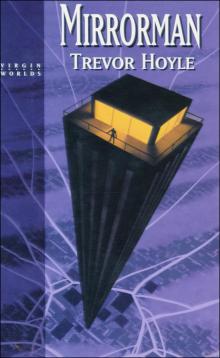 Mirrorman
Mirrorman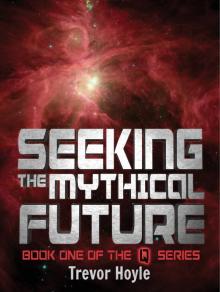 Seeking the Mythical Future
Seeking the Mythical Future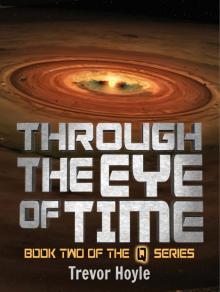 Through the Eye of Time
Through the Eye of Time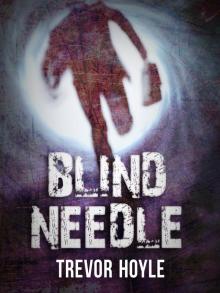 Blind Needle
Blind Needle Earth Cult
Earth Cult